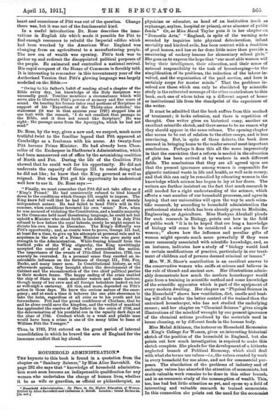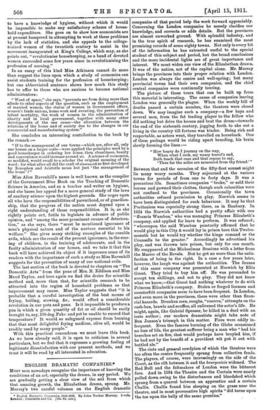HOUSEHOLD ADMINISTRATION.* THE keynote to this book is found in
a quotation from the chapter on " Sanitary Science," by Miss Alice Ravenhill. On page 292 she says that " knowledge of household administra- tion must soon become an indispensable qualification for any woman who undertakes the charge of human lives, whether it be as wife or guardian, as official or philanthropist, as
• Household Administration : Its Place in the Higher Education of Women. Edited by Alice Eavenhill and Catherine J. Schiff. London: Grant ll'chards. [Ss. neta physician or educator, as head of an institution (such as orphanage, asylum, hospital or prison), or as almoner of public funds." Or, as Miss Maud Taylor puts it in her chapter on "Domestic Arts," "England, in spite of the warning note sounded by inquiries into physical deterioration, infant mortality and kindred evils, has been content with a tradition . of good homes, and has so far done little more than provide a smattering of cookery lessons for elementary school girls." She goes on to express the hope that " our most able women will bring their intelligence, their education, and their sense of national responsibility to the task of housekeeping—to the simplification of its problems, the reduction of the labour in- volved, and the organisation of the paid service, and here is certainly scope for master minds." That the problems in- volved are those which can only be elucidated by scientific study is the reiterated message of the other contributors to this book, each one of whom takes up a different aspect of home or institutional life from the standpoint of the experience of the writer.
It must be admitted that the book suffers from this method of treatment ; it lacks cohesion, and there is repetition of thought. One writer gives an historical essay, another an excellent scientific sketch, and there seems to be no reason why they should appear in the same volume. The opening chapter also seems to be out of relation to the other essays, and is less convincing. But, in spite of these defects, the book does succeed in bringing home to the reader several most important conclusions. Perhaps it does this all the more impressively in that the conviction that a reform is needed in the education of girls has been arrived at by workers in such different fields. The conclusions that they are all agreed upon are that the present ignorance among women is responsible for gigantic national waste in life and health, as well as in money, and that this can only be remedied by educating women in the knowledge which science has begun to lay at her doors. The writers are further insistent on the fact that much research is still needed for a right understanding of the science, which affects a vast number of our household processes, and agree in hoping that our universities will open the way to such scien- tific research, by according to household administration the professional status which has been already given to Medicine, Engineering, or Agriculture. Miss Hoskyns Abrahall pleads for such research in Biology, points out how in the field of public work " it is to be hoped that ere long a knowledge of biology will come to be considered a sine qua non for women ; " shows how the influence and peculiar gifts of women might operate much more powerfully if they were more commonly associated with scientific knowledge, and, as an instance, indicates how a study of " biology would lead to certain modifications of practice, particularly in our treat- ment of children and of persons deemed criminal or insane."
Mrs. W. N. Shaw's contribution is an excellent answer to the conservative woman who sniffs at science and believes in the rule of thumb and ancient saw. Her illustrations admir- ably demonstrate how much the modern housekeeper would gain from a training in scientific method and some knowledge of the scientific apparatus which is part of the equipment of every modern dwelling. Her chapter on "Physical Science in the Household" shows how ventilation, dirt, smells and heat- ing will all be under the better control of the trained than the untrained housekeeper, who has not studied the underlying causes ; and her chapter on "Chemical Science" gives simple illustrations of the mischief wrought by our present ignorance of the chemical actions produced by the materials used in house cleaning, or by different foods in the human body.
Miss Mabel Atkinson, the lecturer on Household Economics at King's College for Women, gives an interesting historical sketch of the position of the household in England, but she points out how much investigation is required to make this sketch complete. She pleads for the development of a hitherto neglected branch of Political Economy, which shall deal with what she terms use values—i.e., the values created by work in every household for use alone, and not for commercial pur- poses. The elucidation of the problems of industry and of exchange values has absorbed the attention of economists, but much valuable work remains to be done in this other branch, and in an economic study of the consumption of wealth. This, too, has had but little attention as yet, and opens up a field of interesting and valuable research to trained economists. In this connection she points out the need for the economist to have a knowledge of hygiene, without which it would be impossible to make any satisfactory scheme of house- hold expenditure. She goes on to show how economists are at present hampered in attempting to work at these problems by the lack of statistics, and she appeals to the college- trained women of the twentieth century to assist in the movement inaugurated at King's College, which may, as she points out, "revolutionise housekeeping, as a band of devoted women succeeded some few years since in revolutionising the profession of nursing," In an essay of this kind Miss Atkinson cannot do more than suggest the lines upon which a study of economics can assist students training for the profession of housekeeping ; but one abbreviated sentence shows how much this study has to offer to those who are anxious to become national administrators :
" Want of space," she says, "prevents me from doing more than allude to other aspects of the question, such as the employment of married women, the status of women in Government offices, women's trade unions, home work and sweating, the prevention of infant mortality, the work of women in the administration of charity and in local government, together with many other developments of the one cause—the alteration between the relations of the home and of society due to the changes in our commercial and manufacturing system."
She concludes an interesting contribution to the book by the remark :— " If to the management of our towns—which are, after all, only our homes on a larger scale—were applied the principles used by a good housekeeper in ordering her home, then cleanliness, beauty and convenience would increase around us. A science of economics, so modified, would recall to a scholar the original meaning of the word : for what after all did the craft of olsovoauci as first developed by Xenophon and Aristotle mean but just `the management of the home' ?"
Miss Alice Ravenhill's name is well known as the compiler of the Government Blue Book on the Teaching of Domestic Science in America, and as a teacher and writer on hygiene,
and she bases her appeal for a more general study of the laws of sanitary science upon the highest grounds. She urges upon all who have the responsibilities of parenthood, or of guardian- ship, that the progress of the nation must depend upon a right understanding of those responsibilities. It is, as she rightly points out, futile to legislate in advance of public opinion, and "among the more prominent causes of deteriora- tion," as she says, there "must be mentioned ignorance of man's physical nature and of the nurture essential to his welfare." She gives many striking examples of the curable evils, which are the result of the present ignorance, in the rear- ing of children, in the training of adolescents, and in the faulty administration of our homes, and we take it that this book will have achieved its object if it impresses some of its readers with the importance of such a study as Miss Ravenhill suggests for the prevention of many of our national evils. The last section of the book is devoted to chapters on "The Domestic Arts" from the pens of Mrs. R. Eddison and Miss Maud Taylor, and here again we find the desire for scientific method and, more than that, for scientific research to be attracted into the region of household problems so that improvement may ensue. Miss Taylor suggests that "it is probable that a careful investigation of the best means of frying, boiling, stewing, &c., would effect a considerable revolution in our pots and pans. Is it impossible to produce a pan in which a given quantity of fat or oil should be easily brought to, say, 100 deg. Fahr. and yet be unable to exceed that temperature P It would so safeguard expense from burning that that most delightful frying medium, olive oil, would be readily used by many people."
With this practical conundrum we must leave this book.
As we have already said, it is open to criticism in several particulars, but we feel that it expresses a growing feeling of legitimate dissatisfaction with our present methods, and we trust it will be read by all interested in education.





































 Previous page
Previous page